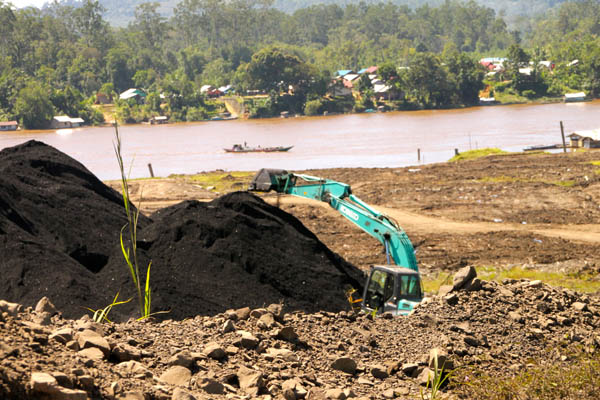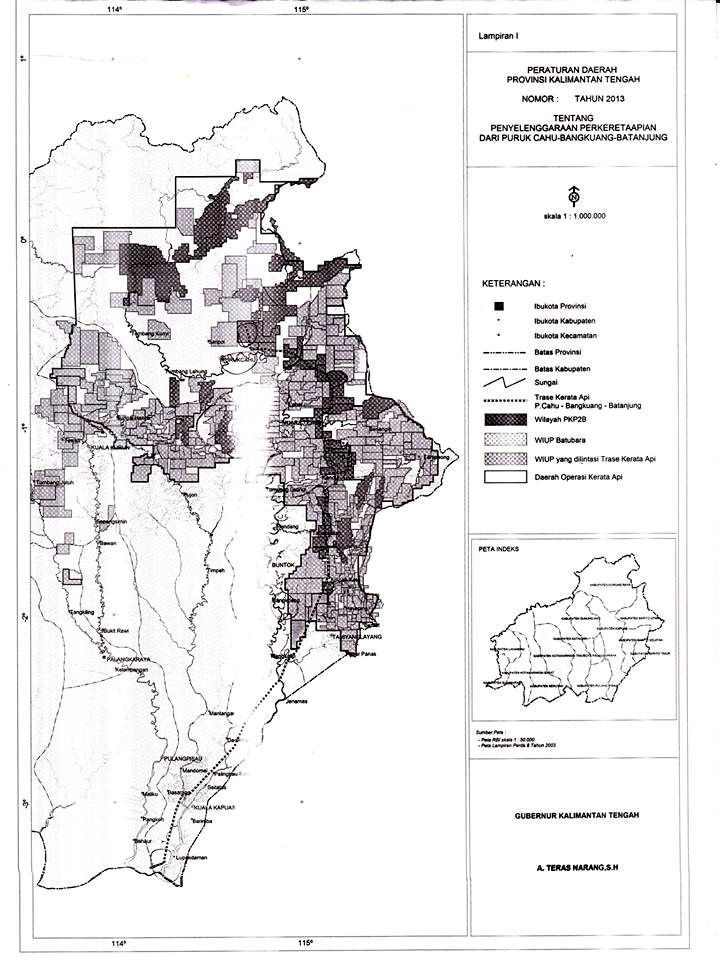Activists have urged the Indonesian government to cancel or reassess plans to build a 148-kilometer coal railway in Indonesian Borneo, claiming the project will be an “ecological disaster” that will destroy watersheds and lead to increased coal exploitation in the region, threatening ecosystems and undermining local government commitments to reduce greenhouse gas emissions.
The railway will be used to transfer coal from mines near Puruk Cahu, in the north of Indonesia’s Central Kalimantan province, to Bangkuang and will run through North Barito, East Barito, South Barito, Murung Raya and Kapuas districts. This means the project will pass through the Barito and Mahakam watershed areas, a fact that raises particular concern among environmental groups.
“The Barito watershed area is a source of life for residents,” said Arie Rompas, executive director of the Central Kalimantan chapter of Friends of the Earth Indonesia (Walhi). “If the project continues, it will threaten the river.”
The development will accelerate the destruction of ecosystems in the heart of Borneo, Arie told Mongabay-Indonesia earlier this month. Companies will profit from the railway, while communities, who he said do not fully understand the project or the potential adverse impacts, will be the recipients of the environmental damage.

Coal piles along a polluted river in Central Kalimantan. Photo: Walhi Kalteng
There has not yet been any environmental impact assessment for the project, Arie said, urging the government to reevaluate its plans. “This project must be reviewed again. If not, it will be an ecological disaster,” he said, adding that environmental groups were working to “build a coalition to reject the development of the coal railway.”
The Puruk Cahu-Bangkuang railway is part of Indonesia’s Master Plan for the Acceleration and Expansion of Economic Development (MP3EI), which aims to improve infrastructure in the country and create “economic corridors” to accelerate development. MP3EI has been criticized by some environmental and indigenous rights groups in Indonesia, who believe the development plan relies too heavily on exploitation of natural resources and large-scale agricultural investments, which would take a heavy toll on the environment and leave communities vulnerable to land grabs.
Indonesian Borneo is part of MP3EI’s mining and energy reserves corridor, and the development of a railway network to transport coal through Central and East Kalimantan is a key part of the area’s development plan.
Kussaritano, executive director of the Central Kalimantan Environmental Partnership, said building the coal railway contradicts Governor Agustin Teras Narang’s commitment to reduce emissions. The project, he said, will lead to displacement of local communities and leave the environment in shambles.
Like many MP3EI projects, the railway will be financed through a public-private partnership – meaning both the government and one or more private-sector companies will contribute funds for the construction.

Kussaritano questioned the government’s decision to use public funds for a project meant to benefit private-sector coal companies. Land acquisition for the railway will place a huge burden on the local government budget, he said, while providing little to no benefit to local communities.
“Will this project be able to increase the already-diminished purchasing power of communities, or will it do the opposite?”
Activists also raised concerns about the lack of transparency in the railway financing process. According to Nordin, executive director of Save Our Borneo, it is not yet clear whether the government will be the primary owner of the railway, or whether private-sector companies will provide the bulk of the investment. Nordin called for the planned project to be canceled, saying it will lead to “massive exploitation of natural resources in Central Kalimantan and will not guarantee energy justice for the people.”
“We object to the development of transportation specifically for coal,” Nordin said. “We want energy justice in Central Kalimantan. This will only benefit foreign companies.”
Plans for the Puruk Cahu-Bangkuang railway have been in the works since 2007, and the tender process was initially scheduled to take place in mid-2012. However, in August the Indonesian news portal Tempo.co quoted the Central Kalimantan governor as saying the tender would likely take place in November this year. Agustin said three companies from China, Japan and the UK were set to bid on the project, which he estimated would cost around $2.6 billion.
Original source: Organisasi Lingkungan Kalteng Ramai-ramai Tolak Rencana Rel Kereta Khusus Batubara